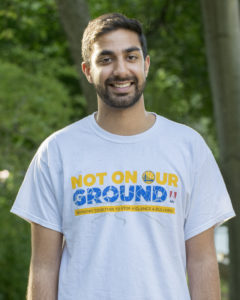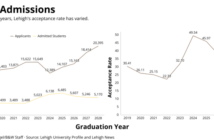
Musa Jamshed
The rainy night spat suppression in my face, but a slip of my hood brought back both my excitement and the New York City-influenced pedestrian pep in my step.
Soaked from the journey, I arrived at my destination, the Litzenberger House on Fourth Street, to find it (predictably) empty.
It would be the venue for my one-man show. So I gave a quick autograph, pulled back the curtains and stepped into the spotlight.
I was one of less than 43,000 people to cast a vote in Northampton County yesterday.
For context, the census estimated about 241,000 county residents in July 2016 were old enough to vote. My back-of-the-napkin calculations are telling me that there was a 17 to 18 percent turnout rate for this election. Pathetic.
So what’s the takeaway here: We suck? That’s the rhetoric I tend to hear most often — that our low registration and low turnout rates are a byproduct of political apathy in our not-so-well-educated country.
Trust me, I’m never going to argue with someone about the incompetence of the average U.S. citizen. However, I will fight to the death with someone who says that’s the reason for our low voter turnout.
The real reason is that our government does not want to maximize the number of voters.
I firmly believe this, and though it might sound like a conspiracy theory, I will put forth my clear evidence, and I challenge anyone who disagrees to email me at [email protected] with a response.
Question No. 1: If the government wants to maximize voter turnout, why doesn’t it encourage registration?
According to Pew Research Center, only about 64 percent of the U.S. voting-aged population was registered to vote in 2016. That abysmal number eliminates a third of potential voters right off the bat.
Countries such as Sweden and Germany have virtually automatic registration systems keeping track of voters’ age and location to get them registered. Others, such as the United Kingdom and Australia, encourage citizens to vote by actively seeking out eligible voters with registration forms. The best our democracy has been able to do is pass the National Voter Registration Act of 1993, which lets citizens register at the DMV, at public-assistance offices or by mail.
Nice, another excuse to go to the DMV.
Question No. 2: If the government wants to maximize voter turnout, why does it conduct elections on a work day?
This one is simple. If voting is a priority, it should be made more accessible. Believe it or not, people who work all day get tired and might decide against voting because of it. In another sophisticated logical conclusion, I’d like to hypothesize that lines pile up after work because that is when people have time to go.
Some countries that have decided against this: Austria, Belgium, France, Germany, India and New Zealand. All conduct their elections on either weekends or holidays. What if we eliminated one of our useless holidays like Columbus Day and replaced it with Election Day?
Question No. 3: If the government wants to maximize voter turnout, why does it suppress voters?
Forgot about the fact that we elected Donald Trump in the first election in 50 years without the full protections of the Voting Rights Act? I didn’t.
This one is a partisan issue, with Republicans always pushing for extra measures, like voter IDs, to prevent “voter fraud.” First of all, voter fraud has never existed. And to illustrate the magnitude of this issue, I’ll leave you with these quotes from Judge Diana Gribbon Motz, who ruled that a voter-ID law in North Carolina was unconstitutional.
“The new provisions target African-Americans with almost surgical precision” and “impose cures for problems that did not exist,” Motz wrote for the panel.
Yikes.
These three reasons should be more than enough to convince anyone the causes of low voter turnout are obvious and addressable.
But before I forget, it’s time to play devil’s advocate for the briefest second to address the only possible counterargument for what I’ve said. According to a Pew Voting Frequency Survey, the largest reason unregistered voters are not registered is they simply do not want to vote.
Fair enough, but would it hurt for them to be registered? No.
With all of these good ideas, I’m starting to think I should run the country. Except maybe it’s not that the government can’t understand these concepts — maybe it’s afraid to make these changes. What if one of the parties would dominate every election with 100 percent voter turnout? That could ruin our entire two-party system!
Oh well, maybe it’s not a big deal then. Let’s just keep ignoring this problem and calling ourselves the greatest democracy in the world instead.
—
Musa Jamshed, ’19, is the data and graphics editor for The Brown and White. He can be reached at [email protected].





Comment policy
Comments posted to The Brown and White website are reviewed by a moderator before being approved. Incendiary speech or harassing language, including comments targeted at individuals, may be deemed unacceptable and not published. Spam and other soliciting will also be declined.
The Brown and White also reserves the right to not publish entirely anonymous comments.
3 Comments
My government wants leagal citizens to vote, people who know what they are voting for. I want voter id, you need it to drive, fly, use a credit card, get an MRI. Why not to vote. The dead elected JFK in Chicago and Barry in Philadelphia. Let’s have truly honest elections one vote for each live leagal citizen!
Here is a transcript of an interesting podcast about voter fraud that engaged actual scientists: https://www.thisamericanlife.org/radio-archives/episode/630/transcript
Spoiler alert: the math tells us it’s not a real thing.
On the other hand, laws enacted in an attempt to combat this myth only succeed in suppressing votes. That seems like the real fraud.
Thank you for voting!
“voter fraud has never existed”: this is a misleading statement which is illuminated by clicking on the words, which then brings up info on the Trump election. PA history has many incidents of voter fraud. Dead people in Georgia (those who were inventive enough to cast ballots) all voted for Herman Talmadge Sr. as Governor. Governments have tried, generally successfully, to cut down on that.
I agree with your idea of making one of the holidays election day so that voting would be easier. I am not sure that participation would increase. People who usually don’t vote would probably find something better to do on that holoiday. It seems from the data that turnout of registered voters is very high in the US. I don’t think the government is stopping most people from voting. People don’t care enough to register. When a vote comes up unregistered people can’t vote. Our government makes it possible to vote freely. It doesn’t matter enough to many to make a small sacrifice to vote.
Thanks for your Northampton County vote.